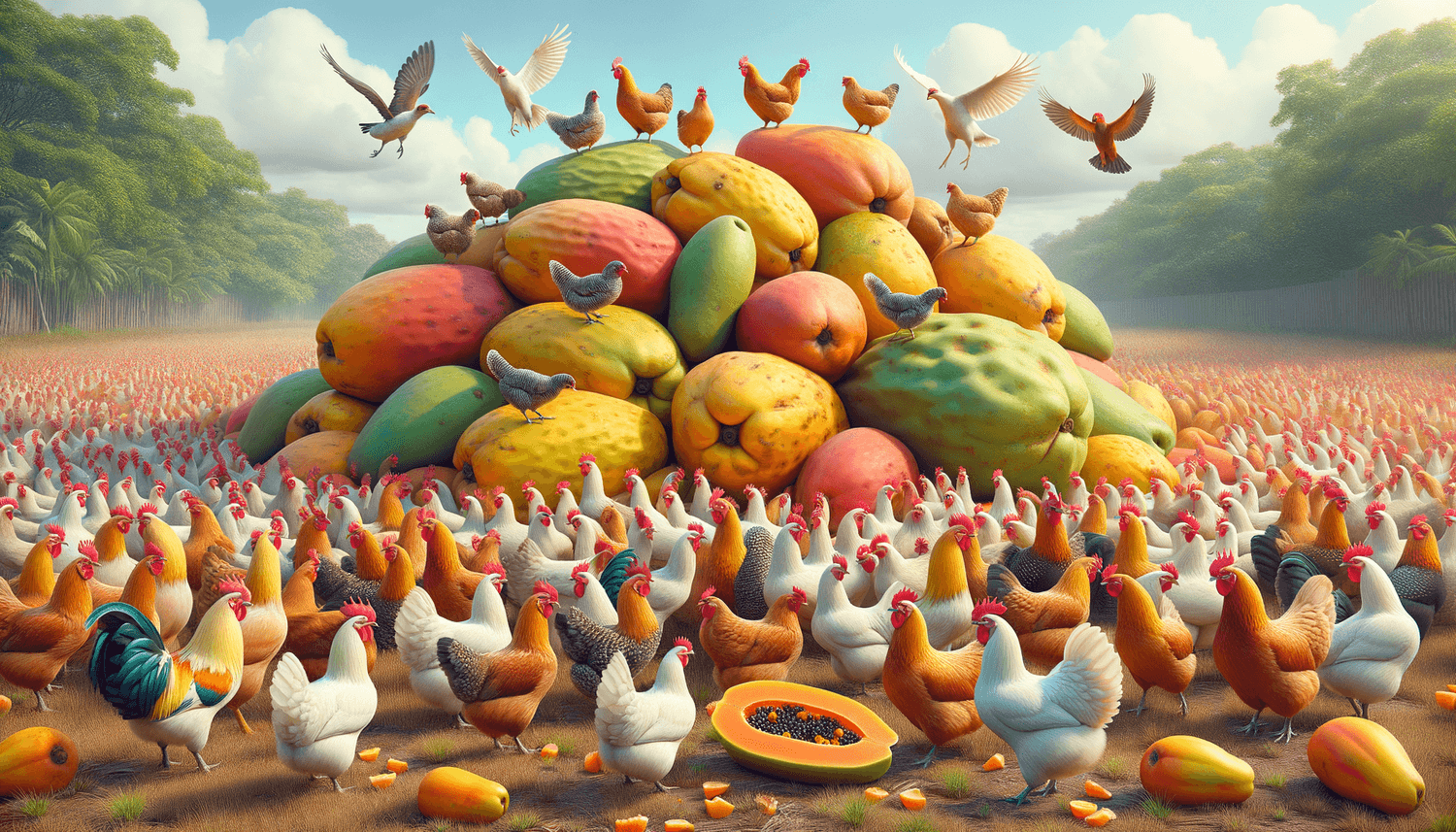Are you ready to scratch the surface on the pecking order of the pawpaw and its suitability for your scrappy backyard flock? Let’s cluck and join together to explore whether your feathered friends can gobble up this sweet, tropical fruit, or if it’s a big hen-no! In this wisdom-packed blog, we’ll dive into the nutritional value of pawpaws for chickens, any potential benefits or risks of this treat, and the art of preparing that lovely pawpaw meal to satisfy your chickens’ adventurous taste buds. So get ready to ruffle some feathers and lay your eyes on the egg-citing, poultry-filled world of pawpaws and chickens!
Can chickens eat pawpaw?
Yes, chickens can indeed eat pawpaw, and it is safe for them to enjoy this tropical fruit. Pawpaws are packed with vitamins and minerals that contribute to the overall health of your backyard flock. However, it’s important to remember that treats like pawpaw should be given in moderation, while ensuring the chickens maintain a balanced diet primarily composed of quality commercial feed.
The importance of a balanced diet for chickens
Just like humans, chickens need a balanced diet to maintain good health, develop properly, and produce nutritious eggs. Chicken feed should make up the bulk of their meals, accounting for around 80-90% of their dietary intake. Quality commercial feed is expertly balanced, designed by professionals to contain the proper ratio of essential nutrients, vitamins, and minerals to meet your flock’s needs.
The remaining 10-20% of your chickens’ diet can be filled in with a variety of treats, including fruits and vegetables. Introducing these goodies not only offers health benefits from their diverse nutritional profiles but also provides a source of entertainment for your inquisitive hens, encouraging natural foraging behaviors. However, it’s key to remember that moderation is the rule, ensuring that the mainstay of their diet continues to be high-quality chicken feed.
Nutritional value of pawpaw for chickens.
Feeding pawpaw to chickens indeed has nutritional value, as this tropical fruit packs a variety of vitamins, minerals, and other healthful components. One of the most notable benefits of pawpaw is its high vitamin C content, which supports a strong and healthy immune system for your chickens. This fruit is also a good source of other essential vitamins such as A, E, and K, which contribute to overall poultry health.
Additionally, pawpaw contains valuable minerals like magnesium, potassium, and calcium. These minerals play crucial roles in the proper functioning of muscle and bone development, enhancing eggshell strength as well. Furthermore, pawpaw flesh is hydrating and contains a moderate amount of dietary fiber. Hydration aids in maintaining metabolic functions, while fiber helps with digestion and maintaining a healthy gut.
Beyond its robust nutritional profile, pawpaw also boasts natural enzymes like papain that can help with breaking down proteins, potentially easing digestion for your chickens. Offering pawpaw as a treat can have numerous health benefits, provided you give it to the flock in moderation while ensuring the majority of their diet consists of quality chicken feed.
Nutrition table of pawpaw for chickens.
| Information | Description |
|---|---|
| Nutritional Value | High in vitamins A, C, E, and K, and minerals such as magnesium, potassium, and calcium. |
| Suggested Serving Size | A few small pieces occasionally, ensuring it does not exceed 10-20% of their diet. |
| Safe Feeding Practices | Offer in moderation to maintain a balanced diet, preferably chopped in small pieces for easy consumption. |
| Preparation | Remove seeds and skin, then chop the fruit into bite-sized pieces. |
| Potential Risks | Overfeeding can lead to an imbalanced diet and potential health issues. |
| Hydration | Pawpaw has a high water content, keeping chickens hydrated and maintaining their metabolic functions. |
| Digestion | Contains a moderate amount of dietary fiber and enzymes like papain, which aid digestion. |
| Seasonal Availability | Typically available during late summer and early fall, depending on the region. |
| Other Benefits | Strengthens the immune system, promotes muscle and bone development, and enhances eggshell quality. |
Introducing pawpaw to your chickens
When offering pawpaw to your chickens for the first time, it’s essential to introduce it gradually, monitoring how they tolerate this new source of nutrition. Chickens’ preferences for fruits and vegetables can differ, so do not worry if your flock isn’t immediately smitten with pawpaw. It may take some time for them to get accustomed to the fruit’s texture and flavor, or they may naturally prefer other foods. Just remember that variety is key when it comes to providing your chickens with a range of healthy treats.
Other treats for your backyard flock
Besides pawpaw, there are numerous other fruits and vegetables that serve as excellent treats for your backyard chickens. Popular options include apples, berries, melons, and leafy greens like spinach, which are all rich in vitamins and minerals. It is important, however, to avoid feeding them potentially toxic foods, such as avocado, chocolate, and anything from the allium family (onions, garlic, etc.). Be sure to do your research before introducing any new treat to your chickens, ensuring it is safe and nutritionally beneficial for them.
The bottom line: Pawpaw as a treat for your chickens
In summary, pawpaw is a safe and appealing fruit you can offer to your backyard chickens, given its significant nutritional benefits ranging from vitamins and minerals to hydration, digestion, and more. When providing any treat for your flock, ensure you maintain a balanced diet by keeping treats within the recommended 10-20% of their overall dietary intake. Keep exploring different treats to discover the ones your hens most enjoy while always prioritizing the health and well-being of your flock.

















